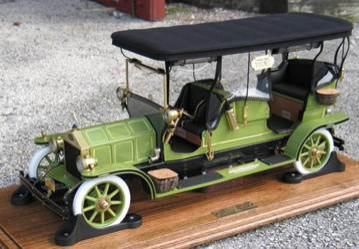‘Great Gatsby’ Cars Instead Of Horse-Drawn Carriages In Central Park? NYCLASS Animal-Rights Group Building Prototype 1920s Replica

Ever dream of zipping around Central Park in a 1920s sedan? If one animal-rights group gets its way, you just might.
NYCLASS (New Yorkers for Clean, Livable and Safe Streets), a nonprofit organization lobbying to do away with carriage horses in New York City, announced on Monday that it is commissioning the construction of the prototype vehicle it hopes will bring the carriage industry into the 21st century -- or at least the 20th.
The vehicle, an electric-powered replica of a 1920s automobile, is being custom built by the Creative Workshop, an automotive restoration company based in Dania Beach, Fla. A miniature version of the vehicle already exists, but creating a full-scale prototype has long been a goal for NYCLASS, which has been lobbying the City Council to agree to a pilot program to test the automobile in Central Park. The program, if approved, would allow passengers to take rides along the same route currently used by the horse-drawn carriages.
NYCLASS has proposed replacing horse-drawn carriages with electric vehicles. In a phone interview, Allie Feldman, the group’s lead organizer, said the idea behind the pilot program is to offer Central Park visitors a chance to see for themselves how such a system would work.
“We just want to compare apples to apples,” she said.
Feldman said she believes that park visitors would opt for the more animal-friendly choice if they were given the chance to see a side-by-side comparison. The problem, she said, is that horse-drawn carriages are granted exclusive passageway through much of the park’s scenic routes, meaning a pilot program cannot happen without the city’s permission.
In the meantime, NYCLASS volunteers have been lobbying members of the City Council in all five boroughs, and Feldman said they’ve so far gained the support of 32 out of 51. Other supporters include Manhattan Borough President Scott Stringer, public advocate and mayoral hopeful Bill de Blasio and celebrities such as Miley Cyrus, Alec Baldwin, Kate Winslet and Bo Derek.
But Christine Quinn, the City Council speaker and early mayoral frontrunner, has opposed the idea. A vocal supporter of the carriage-horse industry, Quinn has been at odds with NYCLASS for some time. Feldman said Quinn’s opposition is frustrating given that the program could be implemented at no cost to the city.
“We don’t know why she won’t support it,” she said. “Maybe she has no heart for animals. All we’re asking to do is try out this one prototype.”
At the same time, NYCLASS has been equally critical of Quinn, saying she has a dismal record when it comes to animal welfare in New York City. Shortly after Quinn announced her candidacy for mayor in March, the group seized upon her reputation as an opportunistic tyrant by launching a satirical meme campaign featuring famous bullies holding Quinn campaign signs.
“We’ve been focused on making sure she doesn’t become our next mayor,” Feldman said.
Despite Quinn’s lack of support, NYCLASS is confident that the pilot program will go forward, so confident in fact that it is putting up the $450,000 it needs to build the prototype vehicle. The group has even capitalized on the upcoming release of Baz Luhrmann’s “The Great Gatsby,” promoting the vehicle as a charming throwback to the stylish era immortalized in F. Scott Fitzgerald’s seminal American novel. Feldman said the Creative Workshop’s president and founder, Jason Wenig, has the artistic chops and technical know-how to bring that vision into fruition. In a statement, Wenig said the replica automobile will infuse 21st-century technology with 1920s charm.
“Even though passengers will feel like they are being transmitted to the Gatsby era, the electric car will have cutting-edge battery and EV technology,” he said.
Feldman said she expects the prototype to be completed by February 2014. While such an “If you build it” outlook might seem overly optimistic considering that the city has not yet agreed to allow a test run, Feldman said she believes that interest in the idea will only grow as support for the status quo continues to wane.
“The carriage horse is a tradition that needs to go,” she said. “We just need to make enough noise until it does.”
Check out a Flickr slideshow of the 21st-century horseless carriage below:
Created with flickr slideshow.
Got a news tip? Send me an email. Follow me on Twitter: @christopherzara
© Copyright IBTimes 2024. All rights reserved.






















